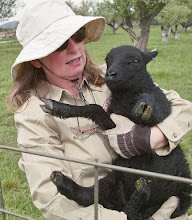On a farm every day includes at least some labor. Today was no exception, today we started the sorting process of the ewes. Any that were marked for butcher or for sale got sorted out into the winter corrals for further evaluation. While this may seem to be just physical labor it's actually a skill that is very hard to learn. How do you select whether a bad mother is worse than bad teeth? Does temperament count and for how much? Will a great fleece offset some grey fibers in the fleece? As we processed the entire flock evaluating and sorting sheep I got to thinking about labor and our attitude towards it in the US.
In many cases we denigrate skilled labor that involves physical labor. A skilled fence builder is as much an artist as a manual laborer. At least a good fence builder is. A skilled tailor is far far better than any off the shelf clothing purchased at the nearest discount store but we don't value skilled tailors and refuse to pay for their services so there are fewer and fewer of them. Farmers, who feed us all, rarely if ever get the actual value of the products they produce if you included all the inflation in the costs they pay for materials and other expenses. Right now the going price for lambs on the hoof for slaughter is running about $1.00 per pound. That is for live weight. The parity price, the price the lamb should be bringing if the costs for all the inputs and an allowance for all the inflation that has happened since WW II was included should be around $2.15 per pound. And a live animal is not all meat. There is the head, hooves, hide, guts and other inedible portions. Even once the lamb is reduced to a carcass the cutting and wrapping will reduce the edible portion further by removal of fat, bones and other trim. And unlike every other major livestock species that is slaughtered in the US, sheep are charged a per head slaughter fee. All other animals are charged based on the carcass weight. If you have small sheep it costs the same to have it processed into meat as it does a large sheep. So meat from smaller animals will always cost more to produce.
Small farms like ours cannot compete against multi-national corporations who will import product from the lowest cost vendor. Most of those imports do not count the true cost of the transportation and may ignore wages, working conditions and regulations that producers here are required to comply with. Our labor is only rewarded if we go outside the standard ways to sell our product and sell direct. And because we are small we will never achieve the economy of scale that a larger company can do. So our food and products are always going to be more expensive than the competing products.
So when you next go to the grocery store and complain abut the high cost of domestic food, keep in mind that maintaining a skilled local labor force that can provide high quality food is critical to the long term survival of a culture. Do we really want to be dependent on other countries for our food as well as our oil?
Food for thought this Labor Day.
03 September 2007
Subscribe to:
Post Comments (Atom)




No comments:
Post a Comment